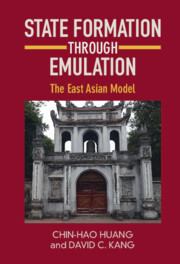Book contents
- State Formation through Emulation
- State Formation through Emulation
- Copyright page
- Epigraph
- Contents
- Preface
- 1 Introduction
- 2 Theories of State Formation and Diffusion
- 3 Phase I and Onwards
- 4 The Absence of Bellicist Pressures in State Formation, 400–800 CE
- 5 Phase II
- 6 Korea and Japan over the Centuries
- 7 Vietnam Emerges
- 8 Epistemic Communities and Regional Connections
- 9 Who Doesn’t Emulate?
- 10 Conclusion
- Appendix Major Events in Sinicization, 300–1100 CE
- Bibliography
- Index
10 - Conclusion
East Asian Developmental States in the Twentieth Century
Published online by Cambridge University Press: 21 July 2022
- State Formation through Emulation
- State Formation through Emulation
- Copyright page
- Epigraph
- Contents
- Preface
- 1 Introduction
- 2 Theories of State Formation and Diffusion
- 3 Phase I and Onwards
- 4 The Absence of Bellicist Pressures in State Formation, 400–800 CE
- 5 Phase II
- 6 Korea and Japan over the Centuries
- 7 Vietnam Emerges
- 8 Epistemic Communities and Regional Connections
- 9 Who Doesn’t Emulate?
- 10 Conclusion
- Appendix Major Events in Sinicization, 300–1100 CE
- Bibliography
- Index
Summary
A massive debate over the origins of the East Asian economic miracles has focused primarily on political and economic decisions taken in the last fifty years. In searching for the origins of strong developmental states, the farthest back in history some have gone is to credit Japanese imperialism of the early 20th century as creating developmental states in Korea and Taiwan. Yet the Japanese colonial experience cannot explain China’s phenomenal economic growth in the past four decades. We move the arguments for organized, institutionalized, orderly East Asian societies back at least one thousand years. In this concluding chapter, we show that many of the “institutionalist” arguments from North, Weingast, and others that purport to explain European economic success over the centuries are totally wrong in the East Asian context. Not only do these East Asian countries have states far earlier than in Europe, they also did not develop central banks or external finance: their massive state operations were financed solely by tax revenues over more than one thousand years. This is a challenge to almost all economic history.
Information
- Type
- Chapter
- Information
- State Formation through EmulationThe East Asian Model, pp. 186 - 196Publisher: Cambridge University PressPrint publication year: 2022
